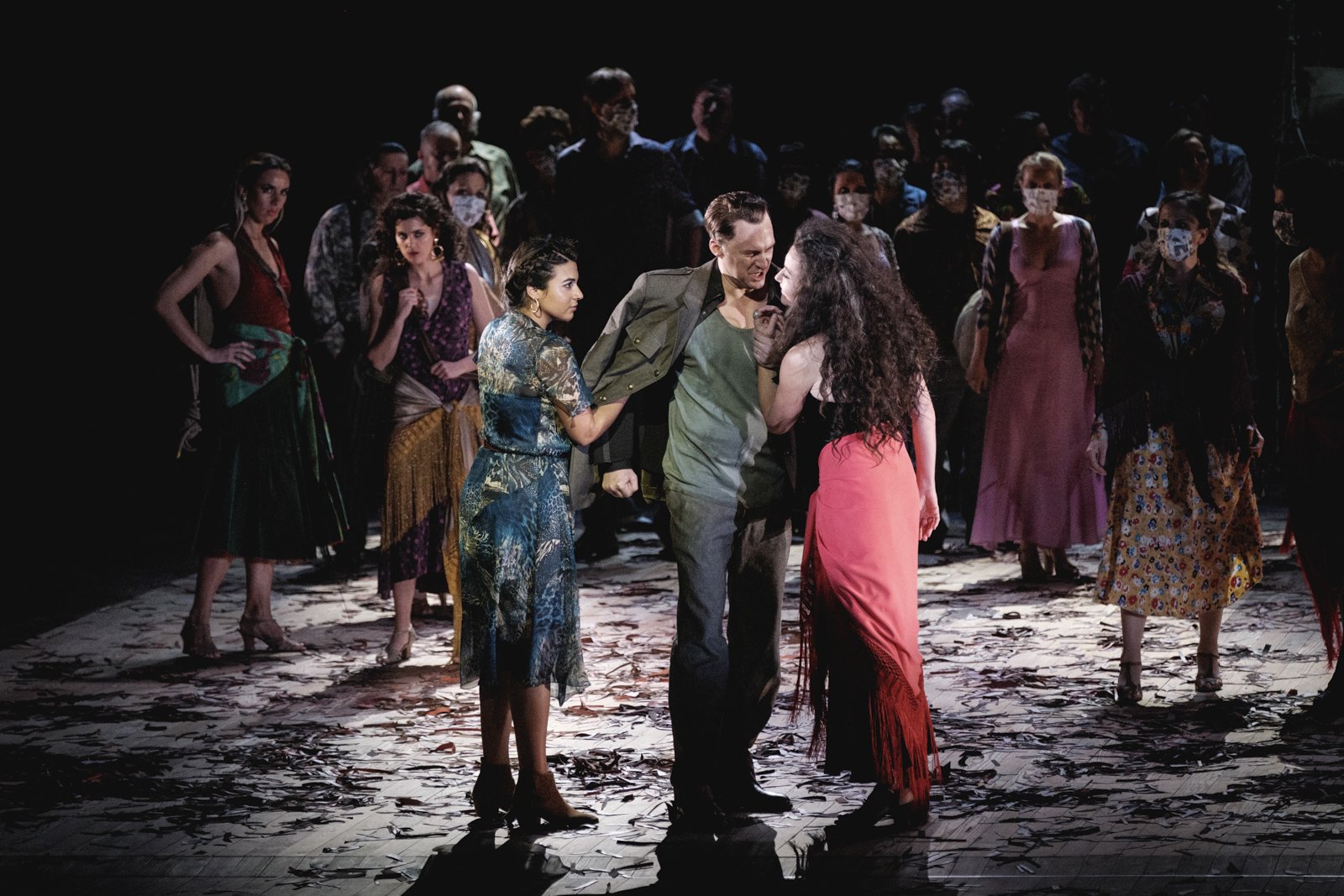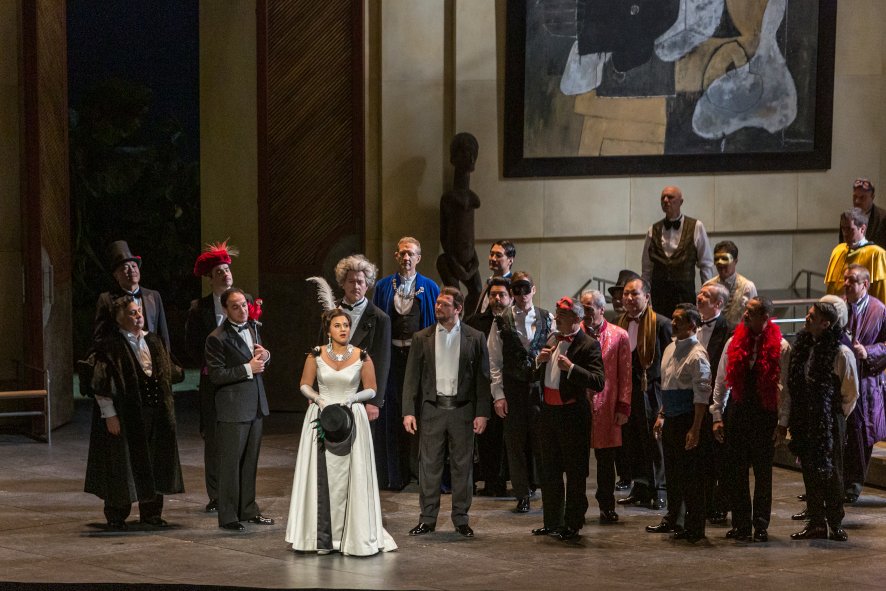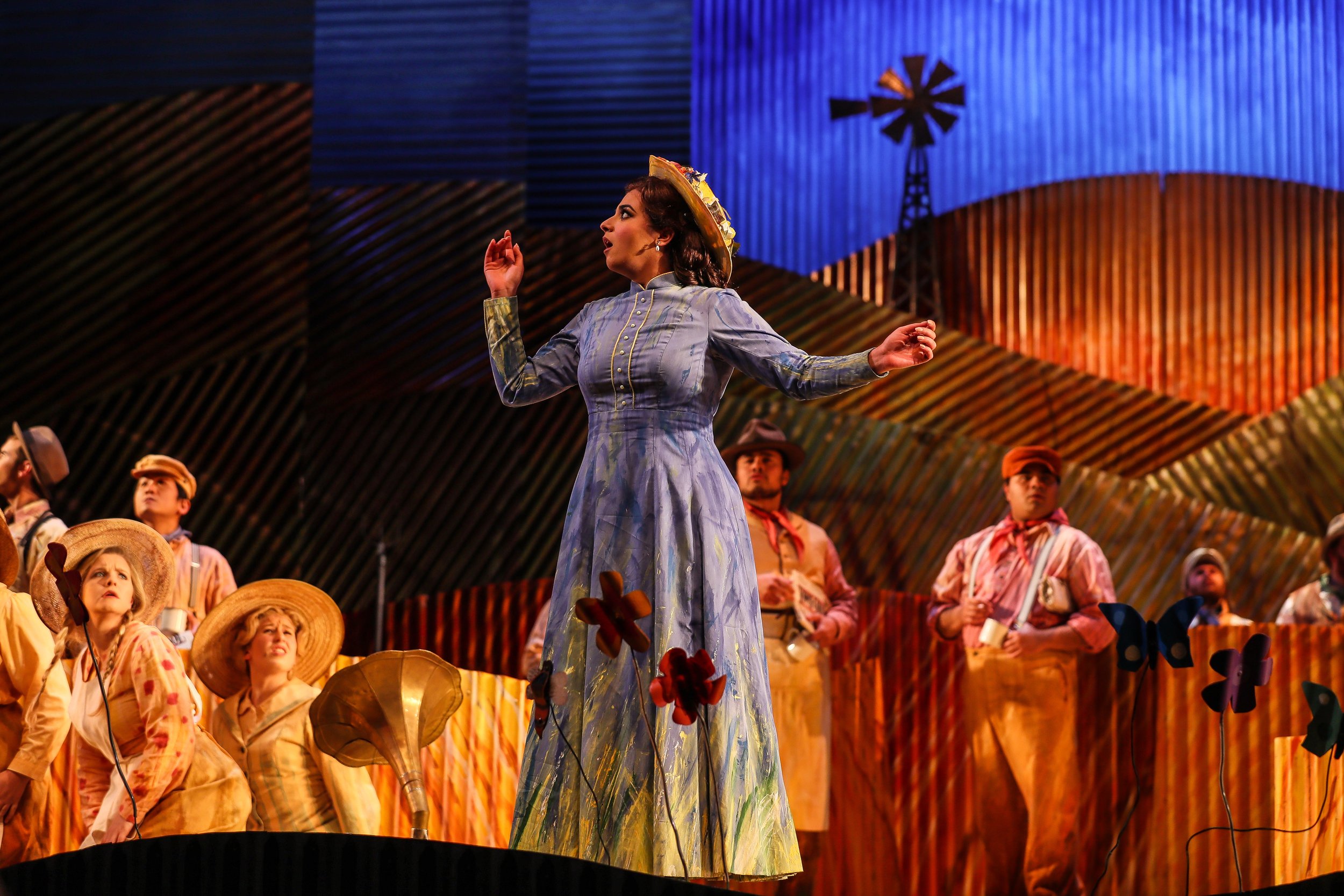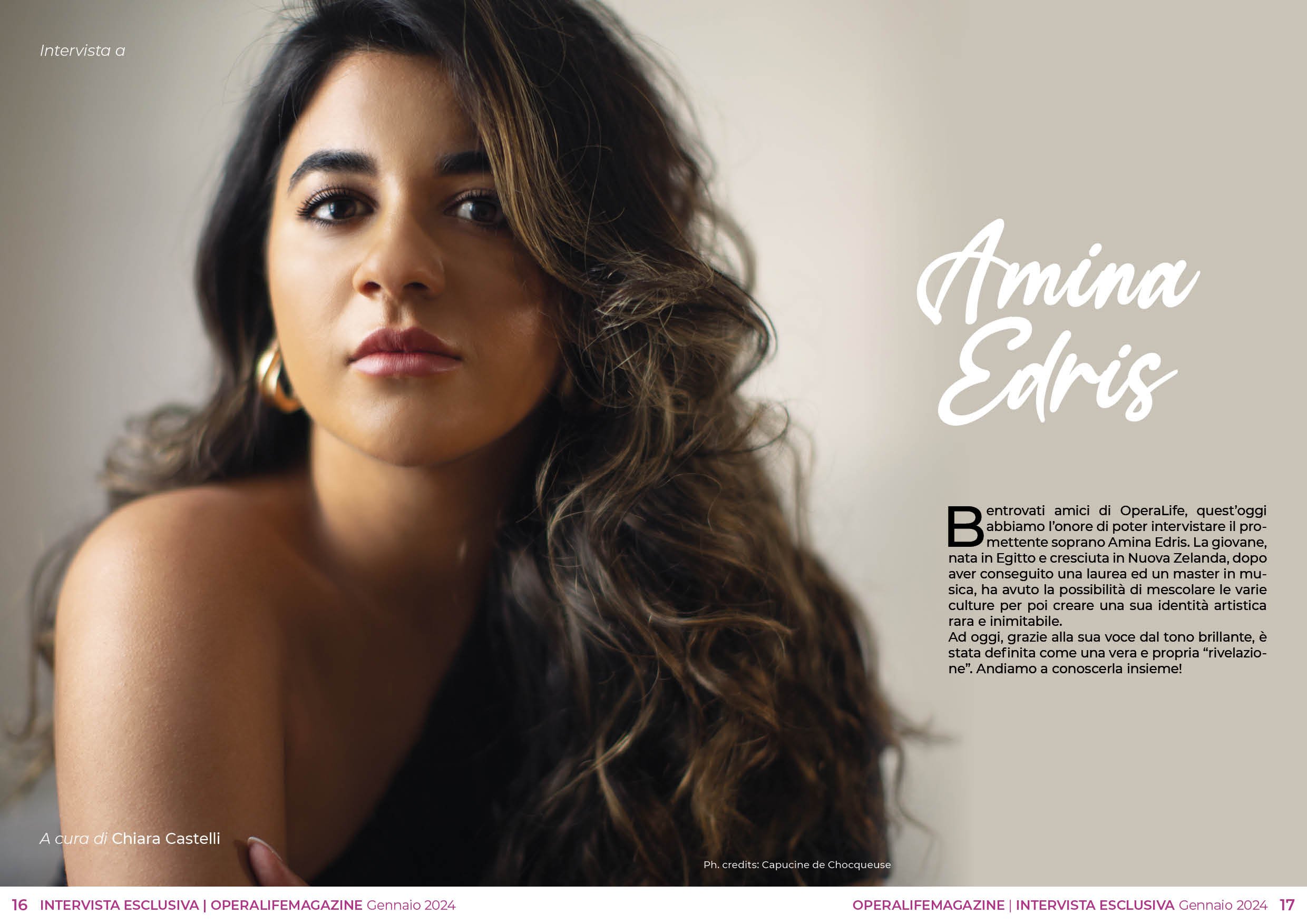
La Bohème
MUSETTA |ROYAL OPERA HOUSE
New Zealand couple's fairytale: Singing La Boheme at the Royal Opera House
“Amina Edris captured the decency as well as Musetta’s considerable vocal allure and theatrical glamour…”
THE GUARDIAN
“Pati is married to the production’s Musetta, Egyptian/New Zealand soprano Amina Edris, who goes full steam ahead with the outrageous comedy of the second act (Stewart Laing’s all-moving set and period Parisian costumes are a wonder). Yet, while she enters fully into the bawdy fun of the character’s risqué antics in the Café Momus scene, Edris brings dignity, sincerity and pathos to Musetta when she arrives in the Latin Quarter attic with the stricken Mimì, where Musetta’s responsible behaviour is so damningly in contrast to that of the immature lads just prior to the opera’s heartbreaking final scene.”
THE STAGE
“Egyptian-New Zealand soprano Amina Edris was a wonderful Musetta, buoyant in her self-confidence and sensuality, and enrapturing the audience with Musetta’s famous aria Quando me’n vo, even taking to walking across the tables of the cafe in her vibrant red dress...”
THE OBSERVER
“Another house debut was that of the versatile soprano Amina Edris singing Musetta. Born in Cairo and raised in New Zealand (and married to Pati), she was convincing first as a flirtatious minx then as loyal and trustworthy friend.”
THE GUARDIAN
Roméo et Juliette
JULIETTE |LA OPERA
“She has youth, charm, and also the determination that the role needs. She moved gracefully, eloquently, winningly both as an actress and as a singer. Her voice ran fluently through the intricacies of the famous role. Her trill was plausible, her coloratura accurate. The sound was clear and pure, and it filled the cavernous 3,156-seat Dorothy Chandler Pavilion…”
CLASSICAL VOICE
“Edris' voice brilliantly radiating warmth as her character moves from joy to sorrow. She had great chemistry with Kim whose strong voice resonated throughout the opera hall. Both singers also tackling the music with passion. Casting these two brought a sense of realness to this production as both are young and filled with energy and masters at projecting hopeless devotion.”
CULTURE CITY OBSERVER
“Juliet Capulet (Amina Edris) is the first of the titular characters to be introduced, floating across the stage, akin to a cloud. As her voice fills the halls of Dorothy Chandler Pavilion for the first time, three things become certain: Edris has a powerful, textured voice, she approaches the audience with an effortless wonder and youthful innocence and Juliet can simply be no one other than her.”
DAILY TROJAN
“Duke Kim, as Romeo, and Amina Edris, as Juliet, deliver emotionally resonant performances taken to the next level by their impressive skill… As Juliet, soprano Amina Edris is nothing less than stunning… she takes on the role of the Italian young lady with passion and aplomb. Beyond being sensual as an object of desire, her intelligence carries the role. From the beginning of the infatuation, she understands the risk of the two of them coming together. Although caught up in the passion, she feels the historical strain of the conflict between the two families. Given such an awareness, Edris communicates the senseless tragedy of the story in a manner that touches the audience’s heart.”
THE HOLLYWOOD TIMES
“Edris brings a captivating brilliance to Juliet, her voice radiating both purity and warmth as she navigates Juliet’s arc from impetuous innocence to profound sorrow.”
INDULGE MAGAZINE
“Amina [Edris], who is Juliet, is like a diamond. She understands the role. She speaks French, so as she’s singing the role, it makes absolute sense, and she’s physically very present. It’s an interesting contrast, because she’s very fiery and warm, and he’s more princely, a little bit more cautious. So the combination of the two creates a really dynamic chemistry.”
LA DANCE CHRONICLE
“Edris exhibits a finesse as a soprano who uses her dexterous and dove-esque voice to sanguinely reach into the heavens, as in “Je veux vivre,” aligning with her character’s noble attempt to capture an elusive happiness. In her Act IV aria, “Amour ranime mon courage,” Edris, with potion in hand, profoundly conveys Juliet’s worst phantom-infused fears, before she is reassured by her unremitting love for Kim’s Romeo.”
LA EXCITES
“Ms. Edris’ Juliette was an equally beautiful creation. I’m sure I don’t know what was going through Mr. Gounod’s mind when he composed Juliette’s first entrance. It’s the most wide-ranging, ungainly piece of vocal writing and does nothing but present an insurmountable challenge to the soprano singing it. Ms. Edris did better than most and then covered herself in glory with an “Ah! Je veux vivre” that lacked nothing in charm and grace...”
PARTERRE BOX
“Edris’s Juliet was the perfect mix of steely determination and romantic abandon, mirrored in a voice that ranged from warm and shaded in the middle registers to shimmering and birdlike in the top notes.”
SEEN AND HEARD INTERNATIONAL
“Amina Edris, as Juliet, brought a level of vocal brilliance that can only be described as otherworldly. Her soprano soared effortlessly, radiating warmth and purity, capturing Juliet’s journey from youthful exuberance to heart-wrenching tragedy with a skill that left no emotional stone unturned. Edris’s rendition of the famous aria “Je veux vivre” was a standout, her voice glittering with the joy of first love, while later scenes saw her tone darken with grief and desperation, leaving me breathless with her range and depth. It was a performance not just of technical mastery, but of true artistry.”
STAGE AND CINEMA
Faust
MARGUERITE |OPÉRA DE PARIS
“La voix est belle, délicate, et son interprétation est dramatiquement une réussite.”
“The voice is beautiful and delicate, and the performance is a dramatic success.”
PREMIÈRE LOGE OPÉRA
La Prophète
BERTHE |BARD OPERA
“As Berthe, Amina Edris sang with beguiling sensitivity, unfailing accuracy and a tone of dark steeliness, bringing resoluteness and emotional depth to a character that can feel underwritten… Feinstein and Edris’s stupendous Act IV duet, their lengthy harmonized cadenza receded, surged, and reached unusual height as they climbed in thirds to a roof-raising climax…it was just ravishing music-making. Across the dark hollow of the auditorium, I heard an audience member exclaim under his breath, ‘Wow.’”
NEW YORK TIMES
“She brought a sumptuously rich tone...”
OBSERVER
The exterminating angel
BEATRIZ |OPÉRA DE PARIS
“ d'un chaud timbre de bel canto”
“a warm bel canto timbre.”
FORUM OPÉRA
thaïs
THAÏS |OPÉRA DE TOULON
“...la jeune et brillante Amina Edris construit une belle carrière où Massenet occupe une place de choix puisqu’elle a ajouté Ariane, et maintenant Thaïs, au nombre ses incarnations. Entre l’émission corsée, gourmande et colorée du début et celle, fraîche, pure, fervente, extatique de la fin, la progression psychologique est peinte avec des moyens hors du commun. On ne sait qu’admirer le plus, de cette incarnation habitée, et de ses incroyables qualités techniques, nuances et longueur de voix, aisance d’aigus filés jusqu’au contre-ré, pianissimo, conduite et soutien de la ligne, puissance et légèreté… Dès son « C’est Thaïs, l’idole fragile », lorsqu’elle apparaît, de rouge vêtue, le chant caressant, sensuel voire capiteux, en dit tout autant que ses paroles sur sa nature, toujours élégante. « Qui te fait si sévère ?», le récitatif le plus souple, mêlé d’arioso, au balancement séduisant, est juste. Sa lassitude, ses interrogations du monologue du miroir, qui ouvre le II, ont une force d’émotion peu commune, servie par un orchestre superlatif, languide. Son dialogue avec Athanaël, où chacun invoque sa divinité, « Ah ! pitié, ne me fais pas de mal » est un moment fort. On pourrait énumérer chacune de ses interventions jusqu’à sa disparition exaltée et douce. Une très grande voix, à suivre.”
{“...the brilliant young Amina Edris is building a fine career in which Massenet occupies a place of choice, since she has added Ariane, and now Thaïs, to add to the number of her incarnations. Between the full-bodied, luscious and colourful opening and the fresh, pure, fervent, ecstatic end, the psychological progression is painted with extraordinary skill. We don't know which to admire more, this inhabited incarnation, and her incredible technical qualities, nuances and length of voice, ease of high notes spun pianissimo, control and support of the line, power and lightness... From her "C'est Thaïs, l'idole fragile", when she appears, dressed in red, the caressing, sensual, even heady singing says as much as her words about her nature, always elegant. "Qui te fait si sévère", the most supple recitative, mixed with arioso and seductively swaying, is just right. Her weariness, her questioning in the monologue in the mirror, which opens Part II, have an uncommon emotional force, served up by a superlative, languid orchestra. Her dialogue with Athanaël, in which each invokes his divinity, "Ah! pitié, ne me fais pas de mal" ("Please, don't hurt me") is a highlight. We could list every one of her interventions right up to her exalted, gentle demise. A great voice, to be followed.”}
FORUM OPÉRA
“Amina Edris, de rouge vêtue, déploie dans le rôle-titre une voix aux couleurs mordorées et capiteuses, longue et capable de se plier sans affèterie aux interrogations, affres et angoisses du personnage. La conduite d’ensemble fait l’objet d’une inspiration permanente avec l’emploi de pianissimi et de son filés aériens... la musicalité prédomine, et porte un portait particulièrement juste et profondément sincère du personnage.”
{“In the title role, Amina Edris, dressed all in red, deploys a voice of heady golden hues, long and able to bend without affectation to the character's questions, afflictions and anguish. The way she drives the ensemble is inspiring with her use of pianissimi and aerial sonorities... musicality predominates, and conveys a particularly accurate and profoundly sincere portrayal of the character.”}
OLYRIX
“Dans le rôle-titre, la soprano égyptienne Amina Edris confère à son personnage de courtisane repentie une vraie émotion vocale, au-delà de l’hédonisme de l’instrument, de son timbre empli de suavité, et de sons filés et autres pianisssimi de toute beauté … Devant son pupitre, elle incarne une Thaïs délicate et résignée, victime de sa beauté... la cantatrice ne se contente pas de triompher d’une page à panache avec ses éblouissants aigus, elle dessine surtout une Thaïs fine et sensible qui s’interroge, et pas seulement sur sa beauté…”
{“In the title role, the Egyptian soprano Amina Edris lends herself to a character of repentant courtesan with real vocal emotion, beyond the hedonism of the instrument, her timbre filled with suavity, and spun sounds and other pianisssimi of all beauty... In front of her music stand, she incarnates a delicate and resigned Thaïs, a victim of her beauty... The singer not only triumphs in a page of panache with her dazzling high notes, she also portrays a fine, sensitive Thaïs who asks herself questions, and not just about her beauty…”}
CLASSIQUE NEWS
“En prise de rôle, Amina Edris est une remarquable Thaïs, servie par un timbre d’une séduction immédiate, une fine musicalité et une diction de rêve dans un français tout simplement parfait. L’instrument est plutôt rond et joue remarquablement sur la nuance piano en émettant certains aigus filés d’une grande pureté.”
{“In her role debut, Amina Edris is a remarkable Thaïs, with an immediately seductive timbre, fine musicality and dreamy diction in simply perfect French. The instrument is rather round and plays remarkably well on the piano nuance, emitting some spun high notes of great purity.”}
ANACLASE
OPERALIFE
La bohème
MIMI |CANADIAN OPERA COMPANY
“…the Egyptian-born, New Zealand soprano elicits a profound measure of authenticity, tinting her performance with expressions of stunningly original pianissimo and meticulously considered tempi. Innocence given voice.”
OPERA GOING TORONTO
“… Egyptian-born Amina Edris’ lush lyric soprano is a joy, with warm timbre and natural trills. Unsurprisingly, they’re also a couple in real life, no doubt explaining how their chemistry is so intoxicating. The pair positively exude charisma... Both are such convincing actors that it’s hard to take one’s eyes off them… Mimì’s death scene was poignant thanks to Edris’s sober acting.”
CONCERTO NET
manon
MANON LESCAUT |GRAN TEATRE DEL LICEU
“Su Manon, y esposa en la vida real del tenor Samoano, tuvo en Amina Edris a una intérprete impecable que, bordó un personaje… con una voz siempre bien emitida, segura en el registro superior y de fraseo incisivo y convincente…un triunfo que confirmaron los aplausos del público en los saludos finales.”
{"Manon, the real-life wife of the Samoan tenor, was played by Amina Edris, an impeccable performer who, embroidered a character… with a voice that was always well-emitted, secure in the upper register and with incisive and convincing phrasing… a triumph that was confirmed by the audience's applause in the final bows".}
OPERA ACTUAL
“Amina Edris demostró valentía y entrega, con un primer acto delicado y elegante Je suis encore tout étourdie. En su Adieu, notre petite table, el canto fue generoso de armónicos y con un fraseo gustoso que llamó la atención… su química, además de su empaste vocal con Pene Pati, fue atractiva y teatral… En el duo de Sant Sulpice, supo fundirse con el fraseo de su esposo y acabó la ópera con una muerte de gran fragilidad canora que demostró estar ante una cantante a tener en cuenta para futuros roles y seguimiento de su carrera.”
{"Amina Edris showed courage and commitment, with a delicate and elegant first act Je suis encore tout étourdie. In her Adieu, notre petite table, the singing has generous harmonics and tasteful phrasing that commanded attention… her chemistry, as well as her vocal match with Pene Pati, was attractive and theatrical… In the duet of Saint Sulpice, she knew how to blend in with her husband's phrasing and ended the opera with a death of great singing fragility that proved to be a singer to keep in mind for future roles and the continuation of her career".}
PLATEA MAGAZINE
© Capucine de Chocquese
ARIANE
ARIANE |MÜNCHNER RUNDFUNKORCHESTER
“Amina Edris est une splendide Ariane : l’ampleur de la voix est généreuse, le vibrato chatoyant et les aigus rutilants. Le timbre est d’une délicatesse renversante et le pianissimo final « Recevez-moi » achève de démontrer les talents multiples de la soprano. Tant « Ah, le cruel ! ah, la cruelle! » que « C’était si beau ! » bouleversent le spectateur : Amina Edris incarne les larmes d’Ariane que Massenet tenait tant à représenter. Elle choisit pour ce faire une approche tout en retenue, qui rompt avec l’opulence du texte, créant un contraste typique de l’esthétique classique qui promeut le minimum de moyens pour le maximum d’effets.”
{“Amina Edris is a splendid Ariadne, with a generous range, shimmering vibrato and gleaming high notes. The timbre is stunningly delicate and the final pianissimo of "Recevez-moi" demonstrates the soprano's multiple talents. Both "Ah, le cruel! ah, la cruelle!" and "C'était si beau!" overwhelm the audience: Amina Edris embodies the tears of Ariadne that Massenet was so keen to portray. She chooses a restrained approach that breaks with the opulence of the text, creating a contrast typical of the classical aesthetic that promotes the minimum of means for the maximum of effect.”}
FORUM OPERA
Faust
MARGUERITE |DETROIT OPERA
“Believable in every moment, Edris made the production a character study of a young woman doomed by the choices of others. It was the moments when the show was in her hands that it felt surest, and her exquisite soprano excellently conveyed the character’s emotions. The finest moments of Saturday evening’s performance came with Edris and Borichevsky’s declarations of love in the second act.”
DETROIT FREE PRESS
“Edris, an operatic bel esprit in the making, was an ebullient flourish from start to finish, despite her character’s turbulent circumstances. Edris sang with a youthful vitality laced with a sophisticated technical shrewdness indicative of her training and acquired operatic experiences… during her visceral “Mad Scene,” Edris’ multidimensional lamb-turned-lion interpretation had me convinced of impending greatness. Her French diction was the beau idéal, not surprising given her apparent familiarity with the Parisian operatic world.”
OPERA WIRE
Antony and Cleopatra
CLEOPATRA |SAN FRANCISCO OPERA
“…the part comes off as tailor-made to Amina Edris, whose portrayal of the Egyptian queen is simply enthralling in its scope, scale, nuance and sheer vocal beauty. On a psychological level, if such a thing can be separated from its aural shape and hue, Edris provides an emotional continuum of commanding intensity, while maintaining extraordinary articulation and clarity.”
ADVENTURES IN MUSIC (AIM)
Amina discusses taking on the role of Cleopatra in the world premiere of “Antony and Cleopatra”, as part of San Francisco Opera’s series “Behind the Music.”
“Amina Edris, who stepped in on short notice, sang with force and finesse…”
THE NEW YORKER
“A powerful cast, led by soprano Amina Edris in a potentially career-making star turn as Cleopatra, largely invested Adams’ vocal writing with the heft and clarity it needs.”
“The crowning splendor of Edris’ Cleopatra was an unlooked-for gift… tonally luxuriant, dramatically changeable, inspiring equal degrees of awe and pathos - rose to the challenge in every way”
DATEBOOK
“In a star-is-born turn, she has made the long and complex role of Cleopatra… sensationally and entirely her own. She brings an agile, distinctive voice with a warm middle register and glittering high notes to the part. Moreover, her personal beauty and dynamic stage personality make her a superb fit in a production built around the glamour of Hollywood. She is Cleopatra, ruler of Egypt and Antony’s heart, imperious, commanding, and sometimes impulsive, whether she’s flirting with a tipsy night-after Antony, rounding on a messenger delivering an unwanted message, or standing up to Caesar’s minions.”
CLASSICAL VOICE
“Edris, a magnetic presence in each scene, sang with allure, her amorous aura often derailed by waspish anger.”
OPERA NEWS
Norma
ADALGISA |FESTIVAL D’AIX-EN-PROVENCE
Le timbre agile et pulpeux de la soprano égypto-néo-zélandaise confirme… une présence vocale électrisante.
{The agile and voluptuous timbre of the Egyptian-New Zealand soprano confirms... an electrifying vocal presence.}
OPÉRA MAGAZINE
Elle s’empare, dès son apparition sur scène, du tragique de la partition. La voix est longue, enrobée d’épices safranées comme de poussières d’étoiles, tant dans son medium que son aigu. Elle enroule et déroule les vocalises du bel canto, soulignant les mots-clés de sa partie pour les faire naître et les gonfler jusqu’à l’explosion libératrice, comme des traits ornementés que se plaisait à insérer Chopin, compositeur-pianiste inspiré par Bellini, entre les notes importantes de ses thèmes. Elle joue sur les dynamiques par paliers pour attirer la ligne vocale vers les sommets de l’émotion.
{She captures, as soon as she appears on stage, the tragedy of the score. The voice has a large range, coated in saffron spices like stardust, both in the middle and low voice. She unfolds the vocalizations of bel canto, emphasizing the key words of her part to give birth to them and inflate them until the liberating explosion, like ornamented lines that Chopin, composer-pianist inspired by Bellini, between the important notes of its themes. She plays with the dynamics in stages to bring the vocal line to the heights of emotion.}
OLYRIX
Amina Edris…possède dans le timbre une fraîcheur juvénile et dans l’attitude une simplicité touchante.
{Amina Edris…has a youthful freshness in her timbre and a touching simplicity in her attitude.}
FORUMOPERA
LA TRAVIATA
VIOLETTA | CANADIAN OPERA COMPANY
The revelation of the night though was young Egyptian-New Zealand soprano Amina Edris making her company debut and singing only her second Violetta. Beautiful of tone throughout her registers, with accurate coloratura and no shortage of power, she made just about an ideal Violetta from a vocal standpoint.
BACHTRACK
Edris, another debut, stepped into her role with a rich sound and a softness in her demeanour; the effect was more of the courtesan between shifts, the real Violetta who knows her health is failing and who needs to talk herself up before going to work. Edris brought the same care to her singing, showing off incredible detail work in her most agile moments. She spends two acts offering up truly gorgeous colours, earning herself the right to vocal risks in the third act that pack an emotional punch.
THE GLOBE AND MAIL
...glorious tone and acted with touching vulnerability, her “Addio del passato” a highlight of the evening.
LUDWIG VAN TORONTO
Edris is superb in the role of Violetta; she's got an incredible clarity to her voice, carrying her through the range of Violetta's demanding numbers seemingly with ease. Edris also brings great emotion to the role, and has a certain magnetism to what she does on stage - there were times where I stopped looking at the translations above screen simply because I was so caught up in her performance.
BROADWAY WORLD
IN SONG WITH AMINA EDRIS
LA TRAVIATA
VIOLETTA | OPÉRA LIMOGES
Le tour de force est-il vocal ou théâtral ? Réponse : les deux. La voix est magnifique : il y a dans le timbre charnu d’Amina Edris une profondeur magmatique, une chaleur et un bouillonnement telluriques, évocateurs d’un volcan en pleine effusion. La cantatrice déploie, sans coup férir, les vocalises de « Sempre Libera » avec un naturel et une agilité époustouflante ; souveraine, elle mobilise avec la même beauté les registres dramatique et lyrique aux actes II et III ; enfin, son « Addio del passato » confirme sa perfection technique et la noblesse de son timbre aux infinies nuances. Sa grâce, son jeu scénique et son charisme sont éblouissants : la soprano aborde avec une densité incroyable chaque état émotionnel du personnage. Jetée à corps perdu dans le bonheur, désabusée, lucide, sacrificielle, désemparée : la Violetta d’Amina Edris est un nuancier de l’âme humaine. Brava !
{Is the tour de force vocal or theatrical? Answer: both. The voice is magnificent: there is in the fleshy timbre of Amina Edris a magmatic depth, a heat and a telluric bubbling, evocative of a volcano in full effusion. The singer deploys, without firing a shot, the vocalizations of “Sempre Libera” with breathtaking naturalness and agility; nobly, it mobilizes with the same beauty the dramatic and lyrical registers in acts II and III; finally, her “Addio del passato” confirms her technical perfection and the nobility of her timbre with infinite nuances. Her grace, her acting and her charisma are dazzling: the soprano tackles each emotional state of the character with incredible density. Thrown headlong into happiness, disillusioned, lucid, sacrificial, distraught: Amina Edris' Violetta is a color chart of the human soul. Well done!}
FORUM OPERA
La standing ovation réservée à une Amina Edris bouleversée témoigne du choc reçu par le public. La soprano offre ici une prise de rôle absolument magistrale dans la lignée de sa performance de 2020 pour la Manon de Massenet à Paris. L’Opéra de Limoges ne peut que se féliciter d’avoir eu la primeur d’une telle performance qui confirme que la soprano est une révélation majeure de la scène lyrique. Avec une voix chaleureuse, pulpeuse et dense de l’aigu puissant au grave profond, elle réussit naturellement la quadrature du cercle des trois voix de soprano qu’exige le rôle. Des périlleuses vocalises du « Sempre Libera », au dramatisme incandescent du II, de la simplicité du « Dite alla giovine » à l’« Addio del passato » d’un lyrisme d’une suprême élégance, à faire fondre une banquise, tout est assumé avec une égale finesse d’approche. Au service d’un portrait fouillé qui ne cesse d’évoluer au fil des actes, elle apporte des couleurs rarement savourées, des nuances ineffables, un sens du discours et du tragique confondant pour une jeune artiste. Une émotion mémorable qui donne l’impression de la simplicité.
{The standing ovation reserved for an overwhelmed Amina Edris testifies the shock received by the audience. The soprano offers an absolutely masterful role debut in line with her 2020 performance of Manon de Massenet in Paris. The Limoges Opera can only be pleased to have had the first of such a performance which confirms that the soprano is a major revelation of the opera scene. With a warm, luscious and dense voice from the powerful middle voice to the deep low voice, she easily succeeds in conquering all of the three soprano voices required for the role. From the perilous vocalizations of the "Semper Libera", to the incandescent dramatism of the II, from the simplicity of the "Dite alla giovine" to the "Addio del passato" with supreme elegance and legato, to melt an ice floe, everything is assumed with an equal finesse. In the service of a detailed portrait that continues to evolve over the course of the acts, she brings colors that are rarely savored, ineffable nuances, a sense of discourse and confusing tragedy for a young artist. A memorable emotion that gives the impression of simplicity.}
RES MUSICA
Mais la voix d'Amina Edris présente une autre singularité. Le jeu très engagé de la soprano la fait résonner d'une émotion exceptionnelle, avec quelque chose d'étonnamment charnel. Amina Edris interprète en effet une Violetta très incarnée, amoureuse bien sûr mais aussi infiniment généreuse.
{But the voice of Amina Edris presents another singularity. The very engaged acting of the soprano makes her resonate with exceptional emotion, with something surprisingly carnal. Amina Edris indeed interprets a very embodied Violetta, in love of course but also infinitely generous.}
LE POPULAIRE DU CENTRE

CARMEN
MICAELA | OPÉRA NATIONAL DU RHIN
La voix se marie aussi bien avec celle de Carmen qu’avec celle de Micaëla, interprétée par Amina Edris. Cette dernière est tout simplement impressionnante, non seulement par la projection et les nuances dont elle fait preuve, mais aussi par une interprétation loin du piège de la « coquille vide » dans lequel il est aisé de tomber dans ce rôle. Loin d’être une simple et douce jeune fille dont la plus grande aventure reviendrait à porter des messages à Don José, elle laisse deviner un tempérament affirmé ainsi qu’un désir de femme et non une simple amourette gentillette envers Don José. Ajoutons à cela une diction qui force le respect (l’on n’aurait d’ailleurs aucun mal à la croire native de notre beau pays). Chacun de ses airs est source de plaisir, et l’on attend naturellement avec impatience « Je dis que rien ne m’épouvante » au III, dont elle ne fait qu’une bouchée.
{The voice goes just as well with that of Carmen as with that of Micaëla, interpreted by Amina Edris. The latter is truly impressive, not only by the projection and the nuances that she shows, but also by an interpretation far from the trap of the "empty shell" in which it is easy to fall in this role. Far from being a simple and sweet young girl whose greatest adventure would be to carry messages to Don José, she suggests a strong temperament as well as a desire for a woman and not a simple love affair with Don José, add to that a diction that commands respect (one would have no trouble believing it to be native to our beautiful country). Each of her arias is a source of pleasure, and one naturally waits impatiently for "Je dis que rien ne m’épouvante " at the III Act, of which she handles with ease.}
OPERA ONLINE
"Somptueux soprano lyrique, elle se montre remarquable dans cet emploi. La voix est sonore, colorée et conduite avec art."
{"A sumptuous lyric soprano, she is remarkable in this role. The voice is sonorous, colorful and artfully driven."}
FORUM OPERA
"Dans le rôle de Micaëla, Amina Edris affirme aussi avec talent un caractère bien trempé, loin des oies blanches habituelles, grâce à un timbre plutôt corsé, à sa puissante projection et à sa remarquable homogénéité des registres."
{"In the role of Micaëla, Amina Edris also talentedly asserts a well-tempered character, far from the usual “white geese,” thanks to a rather full-bodied timbre, her powerful projection and her remarkable homogeneity of registers."}
RESMUSICA
"De sa voix au volume imposant et à la belle ductilité, la cantatrice exprimait beaucoup de sentiment et d'émotion dans ses deux interventions les plus fameuses, au premier acte, Tout cela n'est ce pas, mignonne et au quatrième acte, La-bas dans la chaumière."
{"With her voice of imposing volume and beautiful ductility, the singer expressed a lot of feeling and emotion in her two most famous interventions, in the first act,Tout cela n'est ce pas, mignonne and in the fourth act, La-bas dans la chaumière."}
ODB-OPERA
"Son instrument puissant et vibrant, aux aigus ronds et faciles, correspond pleinement à cette vision du personnage."
{"Her powerful and vibrant instrument, with round and easy high notes, fully corresponds to this vision of the character."}
OLYRIX
Amina Edris réalise ce que l’on espérait depuis longtemps : entendre un soprano qui a les moyens de donner enfin toute leur plénitude aux phrases sublimes de Micaëla, au premier comme au troisième acte. La richesse du timbre, la puissance vocale totalement dominée, la diction formidablement sculptée, l’éventail de nuances idéalement accouplé avec le sens du texte et des sentiments exprimés, tout cela fait de sa Micaëla un personnage capable de faire le pendant à Carmen, pendant que jamais encore nous n’avions entendu ni vu (ses qualités d’actrice sont au même niveau). À la fin du troisième acte, quand Micaëla s’oppose directement à Carmen face à Don José (« Ah, José, tu me suivras »/ « Va t’en, va t’en, tu me feras du bien »), on peut enfin connaître la réalisation vocale de l’idée selon laquelle Micaëla et Carmen sont comme les deux faces d’une même pièce, deux tentations antithétiques, mais d’un égal poids face aux atermoiements du faible brigadier.
Amina Edris achieves what we have been hoping for for a long time: to hear a soprano who has the means to finally give all their fullness to Micaëla's sublime phrases, in both the first and third acts. The richness of the timbre, the totally dominated vocal power, the wonderfully sculpted diction, the range of nuances ideally coupled with the meaning of the text and the feelings expressed, all this makes his Micaëla a character capable of being the counterpart to Carmen, during whom we had never heard or seen before (her qualities as an actress are on the same level). At the end of the third act, when Micaëla is directly opposed to Carmen facing Don José ("Ah, José, tu me suivras »/ « Va t’en, va t’en, tu me feras du bien "), we can finally hear the realization of the idea that Micaëla and Carmen are like two sides of the same coin, two antithetical temptations, but of equal weight in the face of the procrastination of the weak brigadier.
TOUTE LA CULTURE
ROBERT LE DIABLE
ALICE | OPÉRA NATIONAL DE BORDEAUX
"Justement, la soprano égyptienne Amina Edris (Alice, fidèle vassale de Robert qui lui évite les enfers), dispose d’une voix pulpeuse agitée d’un vibrato rond et tonique. Son timbre tendre et chaud dans les médiums...Ses vocalises sont précises, portées par un souffle long. Son legato délicat est soigné et ses lignes nuancées."
{"...the Egyptian soprano Amina Edris (Alice, Robert's faithful vassal who spares him from hell), has a luscious, agile voice with a round and youthful vibrato. Her tone is soft and warm tone in the midrange... Her vocalizations are precise, carried by a long breath. Her delicate legato is precise and its lines nuanced."}
OLYRIX
"Mais la plus grande surprise vocale provient de la chanteuse egypto-néo-zélandaise Amina Edris (elle nous a accordé un entretien) qui campe une magnifique Alice : l’émission surprend par son ampleur, le timbre est beau, le souffle long, et ses écarts de registre ne manquent pas d’impressionner, sans compter qu’elle s’exprime dans un français plus que chatié."
{"But the biggest vocal surprise comes from the Egyptian-New Zealand singer Amina Edris (she gave us an interview) who portrays a magnificent Alice: the voice surprises [us] with its scale, the tone is beautiful, the breath long, and [her mastery of the] passagio does not fail to impress, not to mention that she speaks in a French more than 'chatié.'"}
OPÉRA ONLINE
"Lyric soprano Amina Edris portrayed the role of Alice. She has a velvety timbre, with an even, fair vibrato. In spite of her big volume, she has an astonishing ability to sing pianissimi and extreme diminuendi in her top register. She proved this during her entrance aria “Vá! vá! vá! Dit elle” which, although written mostly in the middle register of the voice, has several ascensions to B naturals, all of which Edris emitted with crystalline tone. After the second Act, she returned to the stage to sing “Quand je quitais la Normandie” which follows the same musical pattern as the first appearance. She sang with her expansive dark center, rising easily again to several B naturals, and even a high C in the final cadenza, all while maintaining even rich harmonics throughout her entire register."
OPERAWIRE
"...la jeune soprano égyptienne, Amina Edris, ressuscite d’une voix longue au timbre enveloppant, l’ingénuité d’Alice, ses écarts de registre et le tracé voluptueux d’une ligne qui s’affine dans l’aigu."
{"... young Egyptian soprano, Amina Edris resuscitates Julie Dorus-Gras with an impressive vocal range with an enveloping timbre, Alice's ingenuity, her changes in register and the voluptuous outline of a line which is refined in the upper register."}
FORUMOPERA

MANON
MANON | PARIS OPERA
"Amina Edris literally brought the Opera Bastille to their knees thanks to her unparalleled portrayal of the title-role, vocally as much as theatrically…The warm colours of her timbre lack no allure and, the cherry on the cake, her French is impeccable….A fine actress, Amina Edris moves with elegance on stage and carries her lavish costumes beautifully.”
FORUM OPERA
“Amina Edris immediately asserts herself in Paris, offering an exquisite articulation in the French of Philippe Gille and Henri Meilhac (librettists of this opus) as in the musical phrasing of Massenet, including in the most demanding passages, which find ample support. The voice rises thus, always rich and built towards the upper register. She laughs there with ornaments reinforcing the candid youth of this character (who had just turned 16)."
OLYRIX
“Probably the great discovery of the evening was the Egyptian-American soprano Amina, who was featured in the title role. The artist's voice has a solid and well placed medium register with a great projection and blooming lows, which are perfectly audible and in the upper register the voice easily reaches high C; this is all combined with a pleasant, caressing timbre. In addition, a clear and natural diction that we even often missed with French singers. At the final applause, the audience was literally on their feet, and rightly so.}
IOCO
ROMEO ET JULIETTE
JULIETTE | SAN FRANCISCO OPERA
“With Gounod’s famed “Je veux vivre” Mlle. Edris took command of the stage, revising this aria from its usual status as a soprano showpiece to become the portrait of a young girl full of life, ready to fall in love. Mlle. Edris possesses a beautifully colored, burnished tone, rare for a lyric coloratura soprano, her voice fully capable of sailing through the brilliant coloratura to create a freedom of spirit that we know will soon be crushed."
OPERA TODAY
LES INDES GALANTES
FATIME | GRAND THEATRE DE GENEVE
“…Egyptian soprano Amina Edris outshines them in the eyes of the audience thanks to her famous aria « Papillon inconstant », which she delivers in an equally exquisite and radiant way."
OPERA ONLINE
“Amina Edris as Fatime, who dazzles in the famous
“Papillon Inconstant'”
CONCERTONET

SAPHO
GLYCÈRE | NEW ZEALAND OPERA
"Amina Edris brought a fitting petulance and fiery vocal ornamentation to Glycere, who, jealous of Sapho, manages to wangle her out of the picture (hence her suicide), in a stirring duet and later trio in Act II. "
WASHINGTON POST
"Soprano Amina Edris made a smashing company debut as the viperous Glycère, for whom Gounod took advantage of the acid side of the soprano voice to characterize a villain. She deployed laser precision in vaulted runs upward and pointed high notes to spit venom at her rival."
WASHINGTON CLASSICAL REVIEW
"Ms. Edris is a perfect foil for Sapho, exuding sexuality and cunning with every note she sings and every precise movement she makes. It helps that she has some of the most natural posturing throughout the night, giving her an ease to everything she does."
BROADWAY WORLD
"Amina Edris was the perfect casting choice for Glycère, from her alluring soprano voice to her commanding red dress, you knew from the moment she stepped on stage that she would go to any length to exact revenge on Sapho."
MD THEATRE

L'ELISIR D'AMORE
ADINA | NEW ZEALAND OPERA
"Both Amina Edris and Pene Pati were frankly adorable, vocally and dramatically. Her voice has an intriguing, throbbing vibrato and she has an instinctive way with the bel canto phrases, especially noticeable in the languorous and longing “Quanto amore” duet with Dulcamara. The final climactic aria, too, was expertly executed, full-toned and ravishingly phrased in the cavatina and with pinpoint vocal divisions in the cabaletta. Her Adina was a complicated creature, veering naturally from flirty and vexatious in the first act to a truly touching realisation of her love for Nemorino."
BACHTRACK
"Amina Edris as Adina was the star on the night for me. Her Adina is clever and complex and Edris brought this out in the role and with wonderful singing. The big arias like ‘Della crudele Isotta’ soared."
RADIO NZ
"Amina Edris...is flowing and silky in effortless delivery of the runs, notes and lyrics...a delight to see and hear. Her aria in the final stages of Act II, ‘Prendi’ (“Take it – through me you’re free again”) is sheer beauty. Her various duets are beautifully balanced and generously shared."
THEATREVIEW NZ
"...the heart soaring beauty of Edris’s performance of ‘Prendi, per me sei libero’...many of those present tonight completely enamored by Edris’s portrayal of Adina where she mixes just the right amount of independent sass with the often ill thought arrogance of the attractive and wealthy."
RADIO NZ
IN RECITAL
WITH WARREN JONES
“Of the three, Edris proved most adept at shaping the size and impact of her voice to the circumstances. In particular, a set of four songs by Reynaldo Hahn just before intermission found her singing with a well-judged balance of intimacy and power, bringing a beautifully polished surface to “L’heure exquise” (“The Exquisite Hour”) and stately glamour to the pseudo-Baroque phrases of “À Chloris.” She brought even more liveliness and theatricality to music by Rossini in the second half, delivering the passagework of “The Shepherdess of the Alps” with keen precision, and joining forces with Pati (her brother-in-law in real life) for an ardent account of “La serenata.”
SAN FRANCISCO CHRONICLE
IN RECITAL
WITH STEVEN BLIER
“Edris has an attractively focused tone, capably blending sophisticated sparkle with seductive darkness. She can flirt as a saucy seductress and show simple emotion in more serious numbers. She also was clearly having a good time interacting with her masculine mates.”
THE BAY AREA REPORTER

FLIGHT
TINA | OPERA PARALLÈLE
"Amina Edris proved an ideal vocal fit for Tina, producing a big sound with lots of ping and smooth phrasing. Her enraged coloratura in the opera’s second half was particularly funny and technically impressive."
SAN FRANCISCO CLASSICAL VOICE

THE FUTURE IS NOW
SAN FRANCISCO OPERA | ADLER FELLOW CONCERT 2016
“Following this came a surprise highlight of the concert — the aria 'Robert, toi que j'aime' from Meyerbeer’s rarely heard Robert le diable, sung here with consummate vocalism by soprano Amina Edris. Egyptian-born Amina Edris, who excelled as Norina in a 2015 Merola production of Donizetti’s Don Pasquale, was absolutely stupendous in the role of Isabelle in this difficult aria from Meyerbeer’s Robert le diable. The aria itself was totally unknown to me, but Amina Edris navigated its difficult roulades with utterly amazing vocal agility. This was truly remarkable singing.”
THE BERKELEY DAILY PLANET
“Edris dazzled with masterful legato in Isabelle’s aria from Giacomo Meyerbeer’s Robert le diable, and an amazing staccato as Oscar in the program-closing excerpt from Verdi’s A Masked Ball.”
SAN FRANCISCO CLASSICAL VOICE
“...Edris in a gorgeously forthright and eloquent paced aria from Meyerbeer’s 'Robert le Diable.'"
SAN FRANCISCO CHRONICLE
“A delightful comic turn by soprano Amina Edris and tenor Pene Pati, who sang 'Quoi? Vous m'aimez?' from Donizetti’s La Fille du Régiment. If anyone ever doubted that Amina Edris is not only an exceptional singer but also an outstanding actress, her portrayal of Marie’s vacillating affections for Tonio in this flirtatious duet provided all the proof needed. Along with Pene Pati as Tonio, Amina Edris as Marie was totally in command of this scintillating duet.”
THE BERKELEY DAILY PLANET



































